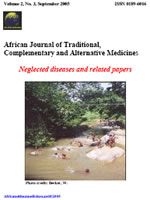
|
African Journal of Traditional, Complementary and Alternative Medicines
African Ethnomedicines Network
ISSN: 0189-6016
Vol. 14, No. 1, 2017, pp. 302-309
|
 Bioline Code: tc17032
Bioline Code: tc17032
Full paper language: English
Document type: Research Article
Document available free of charge
|
|
|
African Journal of Traditional, Complementary and Alternative Medicines, Vol. 14, No. 1, 2017, pp. 302-309
| en |
EFFECTS OF COMBRETUM HEREROENSE  AND CANTHIUM MUNDIANUM AND CANTHIUM MUNDIANUM  water EXTRACTS ON PRODUCTION AND EXPRESSION OF INTERLEUKIN-4 water EXTRACTS ON PRODUCTION AND EXPRESSION OF INTERLEUKIN-4
Samie, Amidou & Madzie, Nditsheni
Abstract
Background: Combretum hereroense and Canthium mundianum are two plants commonly used by traditional healers
in the Northern region of Limpopo, South Africa for the treatment of diarrhea and inflammation. In the present study,
the effects of their water extracts on the production and expression of interleukin-4 by peripheral blood mononuclear
cells (PBMC’S) from HIV positive and negative individuals was evaluated.
Materials and Methods: Blood samples were collected from both HIV positive and HIV negative volunteers and were
used for the purification of Peripheral blood mononuclear cells (PBMC). The PBMCs were cultured together with the
water extracts after activation with phytohemagglutinin (PHA) for three days. Solid-phase sandwich ELISA
(MABTECH) kit was used to detect IL-4 on un-stimulated and stimulated PBMC’S with phytohemaglutinin (PHA) and
plant extracts, followed by the isolation of RNA using RNAesy Qiagen mini kit from the cells. Reverse transcriptase
real time PCR was used to evaluate IL-4 gene expression by the cells.
Results: Combretum hereroense showed higher production of IL-4 at three different concentrations and a significant
expression of mRNA with 4-fold amplification increase at 300µg/ml and 2-fold amplification increase at 20µg/ml.
Canthium mundianum also showed increased production of IL-4 at 300µg/ml, but inhibited its production at 20µg/ml.
Both extracts showed no expression at 50µg/ml. The response of the PBMCs from HIV negative individuals was more
pronounced than that of HIV positive individuals who mostly increased production of IL4 at smaller concentrations
unlike their HIV negative counterparts. Although in vitro studies do not necessarily predict in vivo outcomes, the plant
extracts modulated the immune system by enhancing the production and expression of IL-4 in both HIV- and HIV+
individuals at different concentrations.
Conclusions: For the first time we have shown that the immunomodulatory effect of medicinal plants may depend on
the clinical status of the individual. The present study revealed that the effect of the water extracts from the two plants
on IL-4 expression and production is dependent on the microbiological state of the individual and is dose dependent.
Further studies are needed to identify the active components in the extracts and also characterize the patients further for
a better understanding of the mechanisms of action of these extracts.
Keywords
interleukin-4; peripheral mononuclear cells; HIV; ELISA; gene expression
|
| |
© Copyright [2017] - African Journal of Traditional, Complementary and Alternative Medicines
Alternative site location: http://journals.sfu.ca/africanem/index.php/ajtcam
|
|
